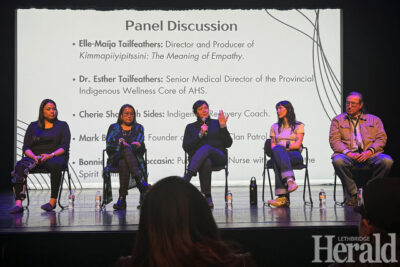Documentary showcases struggles of addiction
By Alexandra Noad - Lethbridge Herald Local Journalism Initiative Reporter on March 30, 2025.
 Herald photo by Alexandra Noad
Cherie Shot Both Sides, Bonnie Weasel Moccasin, Dr. Esther Tailfeathers, Elle-Maija Tailfeathers and Mark Brave Rock participate in a panel discussion about the opioid crisis and harm reduction following the screening of "Kiimmapiiyipitssini: The Meaning of Empathy" at the Yates Theatre on Thursday evening.
Herald photo by Alexandra Noad
Cherie Shot Both Sides, Bonnie Weasel Moccasin, Dr. Esther Tailfeathers, Elle-Maija Tailfeathers and Mark Brave Rock participate in a panel discussion about the opioid crisis and harm reduction following the screening of "Kiimmapiiyipitssini: The Meaning of Empathy" at the Yates Theatre on Thursday evening.Dr. Esther Tailfeathers has been on the front lines of the opioid crisis for the Kainai Nation since it began in 2014.
Her daughter, Elle-Maija Tailfeathers, created the National Film Board documentary “Kiiapiiyipitssini: The Meaning of Empathy” which not only showcases Esther’s work, but also follows many people from the nation who are in the midst of battling addiction and seeking recovery.
This week, a viewing of the film, along with keynote speeches of those who have lived experience, was followed by a panel which included Esther and Elle-Maija along with others who have been on the front lines of the opioid crisis.
The film focuses on harm reduction and its importance, especially when it comes to the opioid crisis.
Both Esther and Elle-Maija visited the Vancouver Downtown Eastside to learn about harm reduction, which includes detox centres, supervised consumption sites and medication-assisted treatment such as Naloxone and Methadone.
While many members on the Blood Tribe were against harm reduction, as many had an abstinence-based view on addiction treatment, through education many members now agree with harm reduction and carry Naloxone kits.
It’s illegal to purchase alcohol on reserve, so some of those who are struggling with alcoholism turn to solvents and other substances, which can cause adverse health effects.
To help reduce deaths due to ingestion of solvents, sites in the Downtown Eastside in Vancouver have a trade program where the clients could bring solvents to trade for an alcoholic beverage. Esther and her daughter took ideas from Vancouver to implement on the Blood Reserve. It became the first reserve in Canada to have a detox centre on site.
Since the film first came out in 2021, 15 of the people in the film have died due to addiction. Elle-Maija says each one of their deaths was preventable.
“They should be here right now. Every single one of them had value, loved ones, hopes and dreams and purpose and belonging.”
She adds the closure of the supervised consumption site in Lethbridge, which was one of the busiest sites in North America, resulted in deaths due to overdoses skyrocketing and blames those deaths on government policies.
“There are people who have died preventable deaths, many of them in this film, because of government policies and lack of funding and support services program.”
Esther says people on the front lines put a lot of heart into the work they do and often are overlooked or even disrespected.
“So whatever people about those who help in the front line, we need to know that they put a lot of heart into it, they put a lot of reputation into it and the disrespect and the things that are said about people that work hard in the front lines is something that can’t be ignored.”
Cherie Shot Both Sides, from Indigenous Recovery Coaching (IRC), says grief is something Indigenous people are very familiar with, but she has made it her mission to help her people deal with those heavy feelings.
“It is such an important mission for me to ensure that not only are my kids expressing their emotions and understanding what their emotions are and navigating these griefs alongside myself on a personal level, but on a work level, we continue to take care of ourselves.”
The IRC will be hosting its Grief and Loss Program for the second time, as well as hosting the program for staff, as many of them have dealt with loss of clients and loved ones to opioids.
Shot Both Sides adds that kindness and compassion go a long way, especially to those who are dealing with addiction.
The film not only covers the struggles that people with addiction face, but also the discrimination, racism and hate, all because they are Indigenous. Esther says this treatment continues to this day.
“The treatment that our people have, which you saw in the film, still continues and it’s very sad that our people are not safe along the streets in Lethbridge, they’re actually hunted like they were many, many years ago.”
Esther, a physician, believes the simplest way to practice harm reduction is by voting and by considering how policies will affect those most vulnerable, especially when it comes to the privatization of health care.
“Think very, very carefully about how you vote and think about the difference between public healthcare and private healthcare and the people who will suffer the most are the vulnerable population.”
“Kiiapiiyipitssini: The Meaning of Empathy” is available to view for free on Youtube.
24-23




